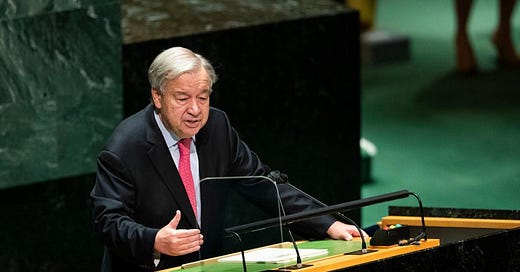Politically unacceptable, morally repugnant, and should be banned
UN Chief outlines next steps for worlds first treaty on AI weapons
Today an advance copy of the long-awaited report of Antonio Guterres, the UN Secretary General, on what to do about autonomous weapons was published. The report was requested by the UN membership in autumn 2023, through a United Nations General Assembly resolution led by 27 states*.
Many have been waiting for this report to outline the urgently needed path for tackling the dangerous challenges of autonomous weapons, which has been stuck at the UN Convention on Certain Conventional Weapons (CCW) for over a decade.
The advanced copy can be found here.
Here’s some of our main takeaways from the Secretary General’s report:
It states clearly that existing mechanisms are not sufficient for the breadth and complexity of challenges that autonomous weapons present.
The UN chief makes it clear what most states want — banning and regulating these “politically unacceptable and morally repugnant” weapons. This isn’t a fringe view - new international regulations on AI and weapons are coming.
The report highlights the complexity of this issue and how it touches on many different bodies of law, such as the UN Charter, international humanitarian law, international human rights law, international criminal law and more.
The different perspectives on autonomous weapons have been discussed in a wide range of multilateral forums, for example the UN Security Council, the Human Rights Council, the CCW, the REAIM summits, an at regional meetings. But most of these bodies have restrictive membership and narrow focus.
The Secretary-General’s report points out that the General Assembly is the most inclusive body and allows for a “wide substantive scope”. The report therefore encourages the General Assembly to now address the issues outlined in this report in parallel to existing discussions.
The final key thing from this report is the sense of urgency: time is running out. The report reiterates the 2026 deadline for negotiating a legally binding instrument on autonomous weapons because “the autonomous targeting of humans by machines is a moral line that must not be crossed”.
The report comes out at a time when momentum on autonomous weapons is finally building, following the successful conference “Humanity at a Crossroads” in Vienna in April. In the three months after the conference, 30 states have endorsed the Chair’s summary. More are expected to endorse this summary that sets out key parameters of the reasons for and substance of a new treaty.
While there certainly remain many unhelpful countries aiming to stop this treaty by insisting on their right to veto any proposal for progress, a pathway forwards is now starting to emerge.
The current speed of technological developments, as reflected in the Secretary-General’s report and by the growing group of endorsers of the Chair’s summary of the Vienna conference on autonomous weapons points towards some clear conclusions:
Most states agree that new rules or laws are needed to protect their own people and their national security concerns. They know that having autonomous weapons on battlefields would be dangerous and not in their interests.
But the time to stop it is running out. If we don’t get rules in place by end of 2026, autonomous weapons will likely be put in charge of deciding who lives and dies — with possibly catastrophic consequences for humanity.
The CCW is not able to deliver any agreement under current consensus rules and with the current geopolitical tensions. Staying in the CCW means allowing these weapons to be produced and used.
The UN General Assembly is the most effective and most inclusive way forward, and the most effective forum where states still have a chance to protect its people against these weapons.
The co-sponsors of the UN General Assembly resolution that requested this report now have the responsibility to take the next needed steps and put forward a resolution in October to start a negotiating process to develop a new treaty to regulate and ban autonomous weapons.
* The 27 co-sponsors of the 2023 UN General Assembly resolution are Austria, Belgium, Cabo Verde, Costa Rica, Croatia, Ecuador, Germany, Hungary, Iceland, Ireland, Italy, Kazakhstan, Kiribati, Liechtenstein, Luxembourg, Malta, Mexico, Netherlands, New Zealand, North Macedonia, Norway, Philippines, San Marino, Sierra Leone, Sri Lanka, Switzerland and Trinidad and Tobago.



